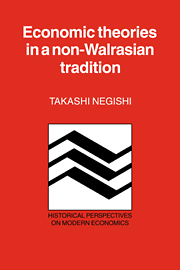Book contents
- Frontmatter
- Contents
- Preface
- 1 Anti-neoclassical or non-Walrasian economic theories
- Part I Increasing returns and diminishing cost
- Part II Wages and profit
- Part III International trade and investment
- 10 The role of exporters and importers in classical and Keynesian theories
- 11 Ricardo, the natural wage, and international unequal exchange
- Part IV Markets and money
- Notes
- References
- Author index
- Subject index
10 - The role of exporters and importers in classical and Keynesian theories
from Part III - International trade and investment
Published online by Cambridge University Press: 21 September 2009
- Frontmatter
- Contents
- Preface
- 1 Anti-neoclassical or non-Walrasian economic theories
- Part I Increasing returns and diminishing cost
- Part II Wages and profit
- Part III International trade and investment
- 10 The role of exporters and importers in classical and Keynesian theories
- 11 Ricardo, the natural wage, and international unequal exchange
- Part IV Markets and money
- Notes
- References
- Author index
- Subject index
Summary
Unlike the neoclassical theory of international trade, the classical theory of international trade emphasized the role of exporters and importers. This can be seen in Ricardo's chapter on foreign trade (1951, pp. 128–49) as well as in the following arguments of Adam Smith on the different employment of capitals.
The capital of the wholesale merchant replaces, together with their profits, the capitals of the farmers and manufacturers of whom he purchases the rude and manufactured produces which he deals in, and thereby enables them to continue their respective trades. It is by this service chiefly that he contributes indirectly to support the productive labour of the society, and to increase the value of its annual produce. His capital employs too the sailors and carriers who transport his goods from one place to another, and it augments the price of those goods by the value, not only of his profits, but of their wages.
(Smith 1976, pp. 362–63)The capital employed in purchasing foreign goods for home-consumption, when this purchase is made with the produce of domestic industry, replaces too, by every such operation, two distinct capitals; but one of them only is employed in supporting domestic industry. The capital which sends British goods to Portugal, and brings back Portuguese goods to Great Britain, replaces by every such operation only one British capital. The other is a Portuguese one. […]
- Type
- Chapter
- Information
- Economic Theories in a Non-Walrasian Tradition , pp. 117 - 131Publisher: Cambridge University PressPrint publication year: 1985

